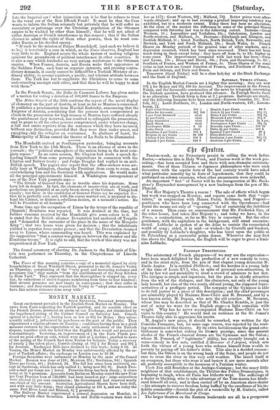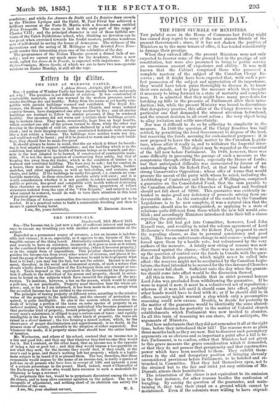Panistari Tazurniceis.
The aristocracy of French playgoers—if we may use the expression— have been much delighted by the production of a new comedy in verse, and in the strict style, from the pen of that elegant young dramatist M. Emile Angier. It is entitled Thiliberte ; and the heroine is a young lady of the time of Louis XVI, who, in spite of personal non-attractions, is able by her wit and amiability to draw a crowd of admirers to her feet. The intrigue is simple and ingenious, but the piece is chiefly attractive from the wit of the dialogue, and the characters, not only of the young lady herself, but also of the two roues, old and young, the supposed repre- sentatives of a profligate period. The company of the Gymnase is able- to do full justice to a piece of this description; and the chief personages are admirably played by Madame Rose-Cheri and M. Bressant, and by a less known artist, M. Dupuis, who acts the old courtier. M. Bressant, whose line may be described as that of Mr. Charles Kemble, is just the sort of actor we want for the English stage—a light comedian with weight. Why has he never accompanied Madame Rose-Cheri on her visits to this country ? He would find an audience at the St. James's• Theatre fully able to appreciate his merits.
M. Augier's new piece, it should be remarked, was written for the Comedie Francaise, but, for some sage reason, was rejected by the read- ing committee of that theatre. By its extra fastidiousnesithe grand esta- blishment is somewhat risking its literary prestige, since the pnesent abodes of the French classical drama are the Gymnase and the Odeon; where M. Ponsard, of " legitimate" ability, has recently brought out a verse-comedy in five acts, entitled L' Hannan. et I 'Argent, which sets forth the -virtues of a young hero who reduces himself from wealth to poverty by paying off his father's debts. This also is a decided success : but then, the Odeon is on the wrong bank of the Seine, and people do not care to cross the river in this very cold weather. The laurel itself is an evergreen, but those who wear it and bestow it are mere mortals after all, perfectly susceptible to the keenness of a Parisian winter.
Uncle Tom still flourishes at the Ambigu-Comique; but the saucy little neighbour of that establishment, the Theatre kles Folies-Dramatiques, is beginning to laugh, when all Paris has hitherto wept. The sufferings of a dealer in blacking, who to take advantage of the Tom-mania has black- ened himself all over, and is then carried off by an American slave-dealer —his attempts to recover freedom being baffled by the excellence of his in- delible commodity—furnish the plot of a vaudeville by M. Guenee, called Les Infortunes d'un Marchand de Cirage. The larger theatres on the Eastern boulevards are all in a prosperous condition; and while Les Amours du Diable and La Boisiere draw crowds to the Theatre Lyrique and the Gaite, M. Paul Feval has achieved a brilliant success at the Porte St. Martin with a five-act drame entitled Yrere Tranquille. The scene is laid in the early part of the reign of Charles VIII; and the principal character is one of those faithful ser- vants of the Caleb Balderstone school, who, thinking no devotion can be too great when exercised towards his feudal masters, performs wondrous acts of self-denial in saving the house of Armagnac. The richness of the decorations and the acting of M. Molingue as the devoted Frere Tran- quite render this interesting piece one of the celebrities of the day. The programmes of the Italian Theatre present a dismal lack of no- velty ; and we cannot say much more for the Academy, where a new work, called Les fours de la Fronde, is expected with impatience. At the Op6ra-Comique, Marco Spada, of which we are to have two non-operatic versions on Easter Monday, is still all the rage.



























 Previous page
Previous page